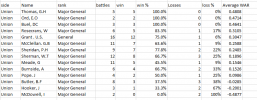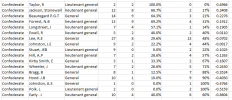I agree that winning is what counts, but I don't think Lee would have been successful with a Vietnam style campaign. Getting the other side to cry uncle isn't just a matter of inflicting casualties and surviving. It's also politics. The importance the other side puts on the issue matters, and preservation of the Union was widely seen as a matter of national survival. I don't think a CSA victory is ASB, but it would be difficult even with Lee adopting a more defensive campaign. Sure the Democrats gained in the 1862 midterms, but they had neither a plurality (which went to the Republicans) nor a majority (which would go to the combined Republican and Unionist seats). And although there were political cartoons such as "Columbia demands her children" there were also political cartoons showing Columbia fighting copperheads, and I think the election results ( both from 1862/63 and 1864) show which of those attitudes was more prevalent.To get back to the thread question this is also where Lee utterly fails, much worse than Napoleon. Lee had one job. ONE. Survive (some would argue protect Richmond, which is valid, but misses the point). Lee had to do the same thing as two other, vastly superior commanding generals, he had to maintain a credible force in the field. As long as an actual Army of Northern Virginia was in the field the Confederate States of America were an actual tangible thing; the moment it wasn't the Confederacy was a memory. Washington understood this, almost two centuries later, another general, also fighting one of the World's super powers, Võ Nguyên Giáp understood it as well. Both understood, as Lee did not, that their real job was to stay on their feet, to out last the enemy. Just stay there and make the other guy bleed until the mothers and fathers and merchants and bankers compelled the enemy's government to pick up their ball and walk away. Anytime Lee advanced his main force beyond his primary defensive works outside of Petersburg he was failing to do his only job. He could surely send Jackson or Longstreet or A.P. Hill, or the glory-seeking J.E.B Stuart North to raise hell and terrorize the countryside as long as they had to obey on ironclad order (on literal pain of death) "do not be drawn into a set piece battle against a superior enemy force".
McLellan's timidity and aversion to casualties reduced bloodshed in the short term, but increased in the long term by not striking major blows against the enemy. With that being said, he does deserve credit for building up the Army of the Potomac into a formidable fighting force.To me Sherman is hands down the best. It’s thought of (outside the US) as a war remarkable for poor generalship, but imo Sherman grasped modern warfare in a way that would translate anywhere.
edit: not on the same level, or even close, but a guy who will make none of these lists and is imo underrated is McLellan.
Diplomatic skills matter in war. If lose because you provoked a neutral country into siding with your enemies or alienated an ally into seeking a separate peace (or even joining your enemy) then you're not good at waging war.I don't really agree with Calbear's assessment of Napoleon. Napoleon's worst failures were diplomatic in nature, rather than in the field. I think it's fair to say Napoleon was the greatest general of his time, while at the same time being a mediocre diplomat at best whose at times abysmal political judgement led to his eventual defeat. And not all generals had the same political power to influence their situations as Napoleon did. A lot of generals won or lost based on circumstances outside their control, before their flaws could truly play out.

